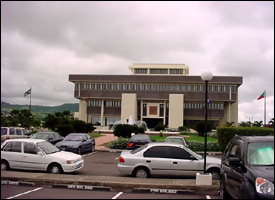
ECCB Headquarters In St. Kitts
Photo By Erasmus Williams
Basseterre, St. Kitts – Nevis
February 14, 2011 (CUOPM)
The eight countries of the Eastern Caribbean Currency Union (ECCU) are to implement sections of the Eight Point Stabilisation and Growth Programme.
Finance Ministers and officials attending the 69th Meeting of the Monetary Council of the Eastern Caribbean Central Bank (ECCB) in St. Kitts were updated on the developments related to the Programme.
“Council agreed that the programme will be implemented in the context of the following strategy: Points 1, 2 and 3 of the Eight Point Programme which address member countries’ financial programmes, fiscal reform programmes and debt management programmes, will establish the first sequence which the region views as critical in establishing credibility through the achievement of macroeconomic stability,” said the communiqué issued at the end of the meeting.
Concurrent with this, financial sector stability is being urgently addressed through points 6, 7 and 8 which are financial safety net programmes; amalgamation of the indigenous commercial banks; and the rationalisation, development and regulation of the insurance sector.
“These elements are essential prerequisites for sustaining growth and socio economic development through points 4 and 5, namely public sector investment programmes and social safety net programmes, which are required to improve poverty and human development indices and transform the region’s economies,” said communiqué.
The Council received a status report on the implementation of points 1, 2 and 3 of the Eight Point Stabilisation and Growth Programme which was adopted by member countries to address the effects of the global financial and economic crisis and to maintain macroeconomic stability.
Council noted that a two-day ECCU Boot Camp was held over the period 24 ““ 25 January 2011, at the ECCB Headquarters for ECCU technicians to refine the fiscal targets presented by the Ministers for Finance at the special meeting of the Monetary Council on 02 September 2010, and to develop a mechanism for establishing annual and quarterly targets and a system for monitoring and reporting on those targets.
Council also received member states’ presentations on their fiscal targets and, within the context of enhanced transparency and accountability, agreed to annual publication of these targets.
Council agreed to recommend that member governments actively pursue debt management strategies through debt restructuring to lower debt servicing costs. Council also recommended a regional approach to negotiations with third party countries on debt reduction.
With respect to the Public Expenditure Commission, Council noted that the Commission began its work to investigate and make recommendations on appropriate ways of rationalising the form and functions of public sector expenditure in the member countries. The Commission’s main activities in 2011 would include (i) conducting country consultations; (ii) assessing existing expenditure levels and arrangements within the ECCU; (iii) reviewing regional best practices; and (iv) identifying operational measures to enhance expenditure effectiveness. Council agreed that the final report from the Commissioners would be completed by October 2011.
Council was updated on recent developments in the ECCU financial system including the ongoing challenges facing the insurance sector. In recognition of the Bank’s mandate to preserve the stability of the financial system, Council noted the Bank’s rigorous programme for monitoring of the region’s commercial banks.
Council reiterated its support for all efforts towards the consolidation of the indigenous banking sector.
Council noted the steps taken to date towards the operationalisation of the Resolution Trust Company (RTC) which would be established to restructure and recapitalise financial institutions and manage troubled assets. Council endorsed the continued collaboration of the Central Bank with the World Bank and the International Finance Corporation (IFC) towards the establishment and operationalisation of the RTC.
Council agreed to recommend that member governments take into consideration the recommendations under Elements 7 and 8 of the Eight Point Stabilisation and Growth Programme, that is, the Amalgamation of the Indigenous Commercial Banks and the Rationalisation, Development and Regulation of the Insurance Sector in crafting their vision for the ECCU financial sector.
Council deliberated further on the recommendations of the Commission on Pension and Pension Administration Reform that were initially presented at the Council meeting in July 2010.
Council approved the recommendations of the Pension Commission in principle however recognised that further technical work would need be undertaken at the national level to facilitate their implementation.
Accordingly, Council agreed that member states would further assess the recommendations, conduct national consultations and report back to the Monetary Council at its meeting in July 2011.
Having deliberated on the importance of addressing the growth/debt nexus, Council approved the terms of reference of the Task Force on Debt, Growth and Development in the context of the OECS Economic Union which is mandated to investigate this relationship in the context of the currency union, with a view to making recommendations to the member governments.
Council noted that the Task Force was a collaborative effort among member countries of the ECCU, the Caribbean Development Bank, the OECS Secretariat, the World Bank, the International Finance Corporation, the International Monetary Fund and the Eastern Caribbean Central Bank.
Council agreed that the first meeting of the Task Force will take place in March 2011 and the Task Force’s report should be completed by October 2011.